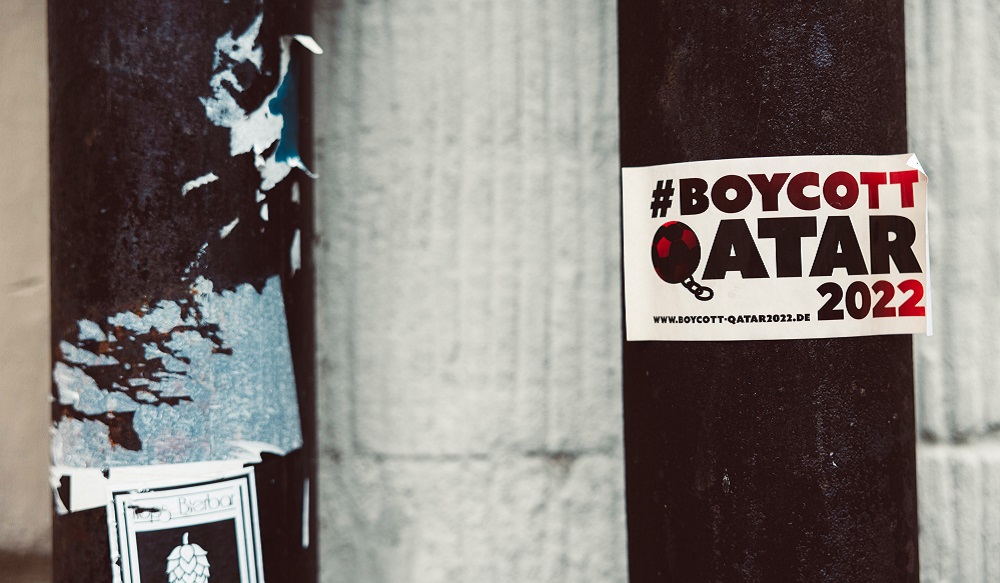It Could Have Been Me: Adam Smith on Empathy and Diversity
Published: 6 March 2023
How Adam Smith accounts for our willingness to empathize and take action.

By Dr Maha Rafi Atal, Lecturer in Global Economy (Politics), School of Social & Political Sciences, University of Glasgow
In the autumn of 2022, Qatar prepared to host a controversial football World Cup. Rampant human rights and labor rights abuses in the country, including the deaths of migrant workers constructing facilities for the event, prompted questions of whether it would be unethical for teams to compete, and calls for fans to boycott watching the games. A YouGov poll released just before the tournament started showed that a majority of England fans would have supported a team decision to withdraw from the tournament in protest. Some Europea cities announced that they would refuse to open "fan zones" for public screenings of the games. At the same time, however, the majority of fans told pollsters they were still planning to watch the games at home.
Boycotts, which ask individuals to alter their consumption habits in the service of protest, are an increasingly common of political activism. Frequently, these boycotts require us to give up something we enjoy or materially benefit from to support victims of injustice in far-away places, whose backgrounds and values may be different from our own. What accounts for our willingness to make that sacrifice, to empathize across physical and cultural distance and to act on that empathy?
For five years, I have turned to Adam Smith’s Theory of Moral Sentiments to help my students answer that question. Smith argued that human morality depends on two things. First, we all have inside us an "impartial spectator," a little voice that makes us aware of how our actions look to other people. We all judge those around us, and so we imagine they are judging us. Everybody, Smith said, wants to be seen to be a good person, and sometimes, that’s enough to make you act like one.
Second, Smith argued, we have the capacity for sympathy, an ability to imagine ourselves in another person’s shoes, and to picture how we would feel there. Our imaginations, however, draw on the seeds of what we know: it’s harder to picture ourselves experiencing the circumstances of people in a place we have never been or whose culture we don’t understand. In one passage, he describes a hypothetical earthquake in China:
Let us consider how a man of humanity in Europe, who had no sort of connexion with that part of the world, would be affected upon receiving intelligence of this dreadful calamity. He would, I imagine, first of all, express very strongly his sorrow for the misfortune of that unhappy people, he would make many melancholy reflections upon the precariousness of human life, and the vanity of all the labours of man, which could thus be annihilated in a moment…And when all this fine philosophy was over, when all these humane sentiments had been once fairly expressed, he would pursue his business or his pleasure, take his repose or his diversion, with the same ease and tranquility, as if no such accident had happened.
Sympathy, Smith says, is good as far as it goes, but it doesn’t go far enough. We read about the earthquake in China and feel sad, but if we have "no sort of connection" to the place or the people, it doesn’t change our behavior. I am reminded of this passage every time I see a wave of "thoughts and prayers" tweets after a disaster, and wonder how many tweeters donated to relief efforts.
Yet, Smith saw two sources of hope for our ability to transcend such parochialism. First, he believed that the "impartial spectator" could overcome the limitations of sympathy, reminding us "that we are but one of the multitude" and judging us for putting our own profit or comfort above the needs of others. Yet, this requires us to imagine that mistreating those far away would be something observers would judge harshly. In a society where everybody’s sympathy only extends to their countrymen, who’s going to hold it against you if yours does too? Smith struggled with this, yet he also believed that international commerce, by binding us into networks of exchange with people different from us, had, at least in theory, the ability to bridge this cultural gap, by making us more aware of what was happening elsewhere and turning people far away into those whose good opinion we would care to secure. He was skeptical that the actually existing economy of his time was achieving this kind of cross-cultural exchange, but hopeful that globalization would make it possible.
Today, we do not have the excuse of not knowing what is happening elsewhere, and many boycotts rely on global communities, on social media, where we can signal our sympathy for a cause and be judged accordingly by observers worldwide. Yet while some are willing to pay a little extra for a more ethical product, or forego supporting our football team at a compromised event, most of us are not. So the jury is still out on Smith's hope.
Photo credit: Markus Spiske on Unsplash
First published: 6 March 2023
<< Scholar
In this Adam Smith and My Discipline series a range of University of Glasgow academics explore the impact of Adam Smith’s scholarship on their fields of work and its relevance for these disciplines today.
Join the conversation
- Follow #AdamSmith300 on Twitter

